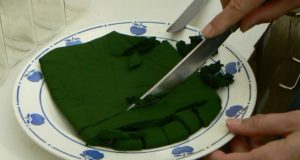
Since one of the functions of your thyroid is controlling metabolism, there seems to be a big connection between the increased rate of thyroid symptoms and problems in America and the increase in weight control problems. The following natural thyroid boosters are ideas that have been shown to help boost thyroid function, and hence help increase metabolism and make it easier for you to lose weight as well as maintain a normal weight.
Thyroid Booster #1: Reduce Iodine Blockers in the Diet
Besides eating iodine-rich foods, it is important to reduce your intake of goitrogens (iodine blockers) like peanuts and soy. All raw cruciferous vegetables like broccoli, cabbage, turnips, kale, and cauliflower are also goitrogens. Make sure and cook them before eating them in significant amounts.
Soy products are probably the worst goitrogen offenders, first of all because cooking does not destroy the anti-thyroid substances in them. Second of all, studies show they are in 70% or more of all foods on our grocery shelves in the form of soy oil, vegetable oil, texturized vegetable protein, soy flour, soy protein isolate, etc. We have been told for quite a while now that soy is good for us, so you may find it hard to believe that soy can actually promote weight gain by interfering with thyroid function. However, there are many studies to back up this claim, so we highly recommend that you follow this suggestion to avoid all soy products, except small amounts of fermented soy like natural soy sauce, tempeh and miso.
Thyroid Booster #2: Reduce Refined Foods and Vegetable Oils
Refined grains and sugars, as well as being bad for you in many other ways, put too much stress on the thyroid and can interfere with good thyroid function. In addition, vegetable oils have been proven to fatten up animals, but also cause them thyroid and other problems, including cancer. So if you want to have a healthy thyroid, reduce your consumption of all vegetable oils — this includes canola, corn, and soy. This also means not eating out or eating packaged foods very much, as restaurants and packaged foods often contain some of these oils.
Thyroid Booster #3: Add Natural Sources of Iodine to Your Diet
Some natural sources of iodine that seem to be well used by the body include unrefined sea salts, kelp, bladderwrack and other seaweeds, eggs, butter, and most sea-foods, especially cold-water deep-sea fish. Fish sauce is also a rich source of iodine if properly prepared, and is often used in Thai cuisine. It may also be useful to supply extra iodine in your diet by taking kelp or bladderwrack extracts or another herbal formula that contains seaweeds as well as other herbs that can be helpful for nourishing the thyroid gland.
Thyroid Booster #4: Add Minerals and Vitamins Approved By Dr. Clarke (The ND For Vitamin Agent.com that Support Thyroid Function
Zinc, chromium, selenium and manganese are all minerals that have been shown to support the thyroid. You can add more minerals to your diet in a natural form that will help support your thyroid gland by using a whole food based greens supplement and/or coral calcium which contains trace minerals like zinc and selenium.
One of the most beneficial vitamins for the thyroid gland is vitamin A, although B, C and E vitamins complexes are also important. Those with hypothyroid often have problems converting beta-carotene to vitamin A, so it is important that you get some real vitamin A. Never take synthetic vitamin A, as studies have shown it to be toxic at higher levels.
Many, if not most of the vitamins you find in the stores today are isolated nutrients that come from synthetic sources. This is generally because these vitamins cost less to manufacture than vitamins from living food sources. However, vitamin supplements that are synthetic do not provide all the co-factors necessary for your body to fully utilize that supplement. So, these products may bring much needed nutrients to your body in the short term, but over the long term will likely cause other problems in your body. Although they are difficult to find, it’s worth it for your health to seek out only 100 percent whole food supplements and super foods.
Thyroid Booster # 5: Get More Exercise, Especially Rebounding
Exercise is also good for your thyroid — any kind. A rebounder can be especially helpful, but all exercise will stimulate the thyroid gland secretion and will help increase the sensitivity of your cells to the thyroid hormones. If you are too tired to get much exercise, you might want to think about adding coconut oil to your diet or perhaps some good super foods to help boost your energy levels so that you feel like exercising.
Thyroid Booster #6: Add Virgin Coconut Oil To Your Diet
Coconut oil, because of its metabolism-stimulating properties, seems to be an excellent thyroid system builder. If you have problems with your thyroid, you want to be sure to include coconut oil in your diet. Remember how we told you that animals got fatter when eating vegetable oils? Well, these same farmers then tried giving their animals coconut oil to see if that would fatten them up without the same problems their animals experienced on vegetable oils. Guess what? It made the animals more active and more lean instead! So add coconut oil to your diet today!
Thyroid Booster #7: Stop Using Fluoride in Your Water and Toothpaste
According to Cherie Calboun in “The Coconut Diet”, a growing body of evidence suggests that fluoride may interfere with proper functioning of the thyroid. This means that if your water is fluoridated, it may be extremely helpful for you to buy a water filter that filters out fluoride. If you’re not sure, check with your water supplier — about 50 percent of America’s tap water is fluoridated today. You also want to avoid fluoride toothpastes, since some of it inevitably will be ingested.
Although none of these suggestions should take the place of your consulting a health care practitioner, many have found that by incorporating them into their lifestyles, their thyroid symptoms got better and it became easier to lose weight.
Copyright 2012 Karen Pijuan. This article may be copied only in its entirety and only if all links, including those in the resource box or the about-the-author section, remain intact.

Source by Karen Pijuan
 Vitamin Agent The Health & Naturalistic Source
Vitamin Agent The Health & Naturalistic Source





